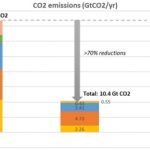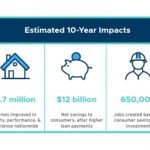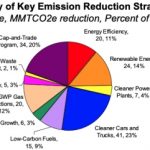Donald Trump has always backed oil and gas, and U.S. industry giants donated $7.3m to his campaign, three times more than for his 2020 run. Joe Biden has introduced green energy policies and other transition legislation, though he has also overseen an increase in domestic oil production and promised motorists he will keep petrol prices low. Both candidates know that U.S. voters are particularly sensitive to the price of their gasoline, in a land … [Read more...]
Is global energy security being used as an excuse to build more U.S. LNG export capacity?
Europe’s energy security is being used as an excuse in the U.S. to build more LNG terminals than are actually needed, argues Ana Maria Jaller-Makarewicz at IEEFA. European gas demand is expected to keep falling. Even with U.S. projects that are currently under construction, its LNG export capacity in 2030 will be 76% higher than Europe’s forecast demand. The U.S. should seriously re-evaluate its strategy or risk overinvestment, says … [Read more...]
How the U.S. can meet its target of halving emissions by 2030
Writing for Carbon Brief, John Bistline at the Electric Power Research Institute summarises his co-authored paper “Actions for reducing US emissions at least 50% by 2030”, the target set by the Biden administration. The paper provides detailed projections and actionable insights about the policies and technology deployment needed to achieve this near-term climate goal. Roughly 70-90% of emissions reductions by 2030 must come from the power and … [Read more...]
Carbon Taxes have a multiplier effect on clean energy policies
President Biden’s Build Back Better package has already had to be cut back drastically. The climate part of the package is to halve the U.S.’s greenhouse gas pollution from its peak by 2030. Given the limitations on what Biden can do, will tax credits alone (favouring low-carbon solutions) achieve the target, asks Meredith Fowlie at the Energy Institute at Haas. She reviews papers that say it almost certainly won’t. However, the addition of a … [Read more...]
The U.S. now needs a Carbon Tax to transition from Gas to Renewables
Gas emissions must be halved (and coal eliminated) by 2030 to meet President Biden’s goal of a carbon free power sector by 2035. The problem is that gas additions are half the price of new wind and solar installations. Though the clean energy champions are still getting cheaper, so are gas additions. Nikos Tsafos at the Center for Strategic and International Studies looks at the policy options over the next decade for the U.S. The stark fact is … [Read more...]
Biden’s Leaders Summit: turning climate commitments into solutions
President Biden's Leaders Summit on Climate last month helped focus minds on making firm commitments to reducing global emissions. As we all know, targets are one thing, credible and realistic solutions are another. To understand the challenge better, Dolf Gielen, Ricardo Gorini and Gayathri Prakash at IRENA break down into themes those areas that need much more effort and, if dealt with successfully, can get us to net zero by 2050: structural … [Read more...]
New U.S. Offshore Wind target: from standing start to 30GW by 2030
In March, the Biden administration announced a bold target to deploy 30GW of offshore wind capacity by 2030. Until now, offshore wind’s rise has been driven almost exclusively by Europe and China. The U.S. accounts for just 0.1% of the world’s installed capacity (versus 17% for onshore wind). Why the hold up, given the U.S. could require up to 400GW of offshore wind by 2050? As Stephen Naimoli and Nikos Tsafos at CSIS explain, offshore costs … [Read more...]
How to ramp up Green Mortgages for climate-friendly house improvements
Green mortgages are used to finance climate-friendly house improvements. In the U.S. they already exist, but need to be made far more accessible and marketed widely. Greg Hopkins at RMI cites their report “Build Back Better Homes: How to Unlock America’s Single-Family Green Mortgage Market” to explain that the financial markets are looking increasingly favourably at lending that is certified as ESG (environmental, social, and governance). … [Read more...]
The dangers of using Climate Policy as a Social Justice tool
Cap-and-trade has been criticised in California for allowing big emitters to pay their way out of reducing emissions and cause pollution. It’s become a social justice issue as poorer communities tend to be located near where the pollution is being created. James Bushnell at the Energy Institute at Haas warns that such clashes are being caused by the mistaken view that climate policy should be a major tool for reducing inequality. In fact, some … [Read more...]
Aviation and Shipping emissions: will Biden take on the challenge?
William Todts at Transport & Environment is very worried about the Biden administration’s approach to aviation and shipping emissions. The signals are that the U.S. wants to work through the International Civil Aviation Organization (ICAO) and the International Maritime Organization (IMO). But they have neither the ability nor the means to spur technological breakthroughs. That matters, because it’s only the use of alternative fuels that can … [Read more...]
U.S. supports carbon capture R&D and commercialisation
Many are hoping that the new U.S. administration becomes a climate leader. Nowhere is leadership needed more than in the field of carbon capture. Most net zero pathways give it an essential and major role, yet the possible solutions are still in their infancy. Anne Canavati at the Atlantic Council looks at the new bills being passed in Washington that appear to be the beginnings of a serious push to develop and commercialise Carbon Dioxide … [Read more...]
How Biden can start to find a compromise on Nord Stream 2
The Trump administration and the U.S. Congress threatened sanctions on European companies helping to build the Nord Stream 2 gas pipeline, and that is still the current position of the new U.S. government. To end the deadlock, president Biden needs to change the tone of the debate and focus on the true interests of the affected parties, explains Nikos Tsafos at the Center for Strategic and International Studies (CSIS). He summarises those … [Read more...]
Biden’s Green New Deal: bipartisan support should clear a path for Nuclear
President-elect Joe Biden knows that a divided Congress and Senate will make passing most legislation very difficult, not least his sweeping decarbonisation agenda. However, there is one area where both Republicans and Democrats share the same goals, and that is nuclear power. Jennifer Gordon at the Atlantic Council explains why this can clear a path for nuclear while other elements of Biden’s clean energy programme may struggle and even fail. … [Read more...]
Zero U.S. power sector emissions by 2035, says Biden. How?
Joe Biden, the Democratic presidential hopeful, wants to reduce U.S. power sector emissions to zero by 2035. That’s more ambitious than Obama, and more than what Biden promised when campaigning to be the Democrat’s candidate. His emphasis has been on the jobs and investment a green economy will create – language that has more voter appeal than reversing emissions. Meredith Fowlie at UC Berkeley’s Energy Institute at Haas reviews the promises … [Read more...]















